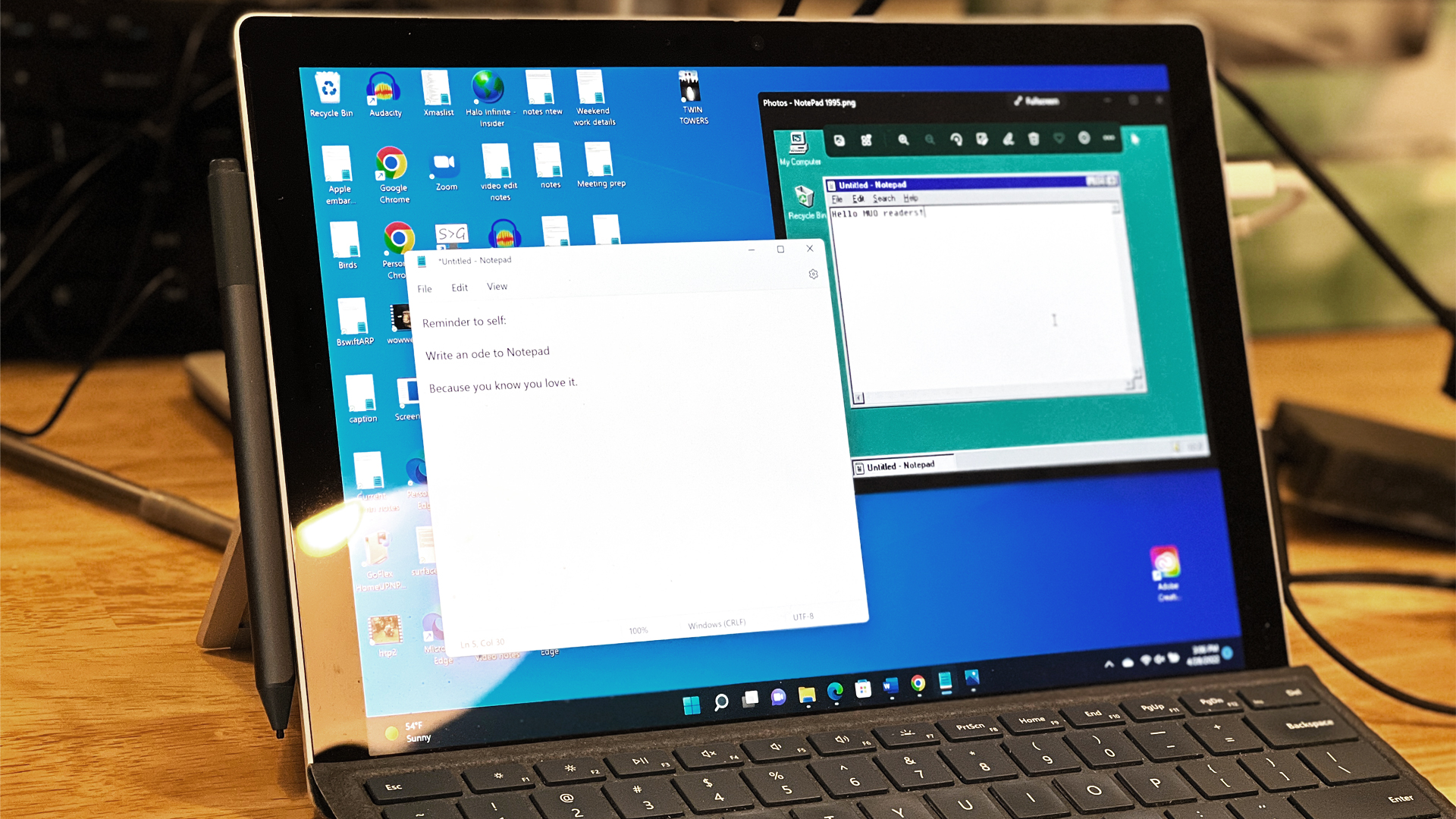I like Windows 11 but I love Notepad
The venerable app's simplicity is genius

It's been there since the very beginning, Windows Notepad, a tiny text editor intended to help show off the mouse-friendly capabilities of Microsoft's first graphical user interface (or GUI).
Early uses, especially with the introduction of Windows 3.1 and, later, the globally dominant Windows 95, included editing system files like AUTOEXEC.BAT and CONFIG.SYS. Doing so in Notepad meant you could edit these system boot and startup files without accidentally introducing any extra code. Editing them in Word, for instance, might've added hidden formating, thereby corrupting the files and making it impossible to start up your Windows PC.
I think people forget how important and useful text editors or apps that work in the ".txt" format are for systems and programming. They're clean, simple, lightweight, and reliably responsible with content.
Even almost forty years since its introduction, though, Notepad remains an important part of my Windows experience and daily routine.
Sure, I no longer edit my AUTOEXEC.BAT file in it - mainly because it was a DOS loader that doesn't exist in Windows today. Still, I find Notepad important for quickly taking notes. If for some reason, I didn't launch Microsoft Word but want to jot down some thoughts or meeting notes, I like to pull up Notepad, which still launches more quickly than any other app on my Windows 11 system. Even if I have five or more Notepad windows open, the load on Windows 11 is minimal. That might not be the case with Word or another word processor app.
If I have a system file or bit of programming and want to see the code, Notepad has the best chance of opening it and letting me see inside.
Notepad also serves its longtime function of format-scrubbing. When I cut and paste links, really text from any other platform or website, I often drop it into Notepad - where it is essentially stripped of all links and formatting - and then copy and paste from there to place it in another platform. I know there are other ways to do this, but the Notepad scrub is still the fastest way.
Sign up for breaking news, reviews, opinion, top tech deals, and more.
That strong resemblance to actual notebooks has led to some abuse, like opening a Notepad file, taking notes, and then forgetting about it. My desktop is littered with these castaways. Or what about the people who put all their passwords in a Notepad desktop file? They might as well write their passwords down on a piece of paper and leave them on their front porch. Even so, I believe the good far outweighs the bad for this native Windows app.
Notepad is an incredibly comforting Windows 11 app because it has changed so little since its Windows 95 version.
The menu is a tad shorter. Where we once had "File," "Edit," "Search," and "Help," we now have "File," "Edit," "View"
Key features like "Word wrap" (without it text just continues off to the right) persist, as do its limitations, like the lack of auto-save, and almost any kind of formatting. I, though, consider the latter a plus. I do not need formatting in a text editor. The other benefit of this clean approach is that text files can be incredibly small (light on bytes).
Notepad in Windows 11 has changed a bit but not in any way that makes the app less useful. Under a new settings icon (it looks like a gear) you'll find the option to set your type font. The default is Lucida Console (of course it's "console") but you can choose from among dozens of different system fonts. If you do choose something other than the default, you can set the style to something besides regular. I consider this a bad choice. Who needs all Bold or italic Notepad files? I do think the size control is nice for those who are struggling to read their text files on our high-resolution desktops.
There's also a dark theme setting, which is like a throwback to the original DOS interface, and CRT-screen programming platforms. I still prefer the light mode, which I think better reflects the notepad theme. I mean, look at the app icon, it's a notepad, not a computer screen.
Notepad is a simpler app from a simpler time, which is probably why I'm so glad it's still part of the ever-changing Windows platform. Microsoft has done a lot in Windows 11 to refresh the aging OS, including shifting the start menu and taskbar to the middle. It's overhauled all the windows, app icons, and even File Manager.
Notepad has a slightly different and cleaner look now, but it's still entirely recognizable as the app I know and love - a simple piece of programming that will load instantly, keep track of my notes, live in folders or the desktop, and ask basically nothing of me. Well, not nothing. Open a new a Notepad window and you'll notice the cursor blinking, beckoning you to type something, anything. Just don't ask it to format it for you.

A 38-year industry veteran and award-winning journalist, Lance has covered technology since PCs were the size of suitcases and “on line” meant “waiting.” He’s a former Lifewire Editor-in-Chief, Mashable Editor-in-Chief, and, before that, Editor in Chief of PCMag.com and Senior Vice President of Content for Ziff Davis, Inc. He also wrote a popular, weekly tech column for Medium called The Upgrade.
Lance Ulanoff makes frequent appearances on national, international, and local news programs including Live with Kelly and Mark, the Today Show, Good Morning America, CNBC, CNN, and the BBC.